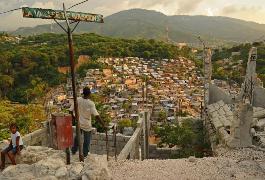Aid agency calls on Haitian government and donors to break logjam and start reconstruction.
 |
| A Haitian man looks at the destroyed homes of a neighbourhood in Port-au-Prince. |
In a report released today,Oxfam called on the Haitian authorities, with support from the international community, to move forward on plans to start rebuilding the shattered country and enable close to one million people still living in tents and under tarpaulins to resettle or return home.
The report, From Relief to Recovery, blames a lack of progress on a crippling combination of Haitian government indecision, rich donor countries’ too frequent pursuit of their own aid priorities, and a lackluster Interim Haiti Recovery Commission, which was established to coordinate reconstruction efforts and build state capacity.
Roland Van Hauwermeiren, country director for Oxfam in Haiti said:
“This has been a year of indecision and it has put Haiti’s recovery on hold. Nearly one million people are still living in tents or under tarpaulins and hundreds of thousands of others who are living in the city’s ruins still do not know when they will be able to return home.
“Rebuilding this shattered country will not happen overnight, but there are key decisions on jobs, clearing rubble, house repairs and allocating land for people who will not be able to return to their homes that can and must be made urgently. We now need the incoming government of Haiti to take its leadership role. The international community, including NGOs, must unite to support the government so that Haitian authorities will have a chance of succeeding. ”
Despite the success of emergency lifesaving aid after last year’s earthquake, long-term recovery from the disaster has barely begun. Public donations as well as funding from donor governments and multilateral institutions for the emergency aid effort were exceptionally generous. However, of the $2.1 billion pledged by governments for reconstruction in 2010, only 42 percent had been given by the end of the year according to the UN Office of the Special Envoy for Haiti.
“Too many donors from rich countries have pursued their own aid priorities and have not effectively coordinated amongst themselves or worked with the Haitian government. This seriously weakens the government’s ability to plan and deliver on its sovereign responsibility – to lead reconstruction,” Van Hauwermeiren said.
Most donors provided funds for transitional housing but very little money for clearing rubble or repairing houses. One year on, only five percent of the rubble has been cleared and only 15 percent of the required basic and temporary houses have been built. House building on a large scale cannot be started before the enormous amount of rubble is cleared. The government and donors must prioritize this most basic step toward helping people return home.
The Interim Haiti Recovery Commission, led by former US President Bill Clinton and Haitian Prime Minister Jean-Max Bellerive, was set up in April 2010 to facilitate the flow of funds toward reconstruction projects and to help Haitian ministries with implementation. So far, the Commission has failed to live up to its mandate. Many Haitian officials still do not have the technical ability to lead projects, and almost no major reconstruction projects have started. The Commission is a key element for reconstruction and it must cut through the quagmire of indecision and delay.
Despite the current political crisis Haiti ’s political and economic elites still have a once in a lifetime chance to address many of the issues that have held back the country’s development. But the process must start now.
“If Haitians are to support themselves then the reconstruction effort must also give priority to helping people earn a living. Above all else, Haitians want to get back to work and provide for their families. They aren’t asking for charity, but for a chance to be part of the process to rebuild their own country. After going through so much last year, Haitians deserve that chance,” Van Hauwermeiren said.
One year on, Oxfam is providing aid to over one million people as part of two emergency responses: one for earthquake relief and one to respond to the cholera epidemic that has swept the country since October, killing over 2,600 people.

Haiti progress report
From Relief to Recovery: Supporting good governance in post-earthquake Haiti.
- Read the full report (PDF 470KB)
- Read the summary (PDF 242KB)
Cholera outbreak response photos
Click on the images below to read the stories.
Slideshow of photos of Oxfam’s Cholera outbreak response. View Oxfam photos on Flickr: Haiti Cholera outbreak response



